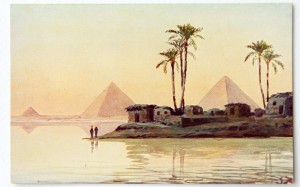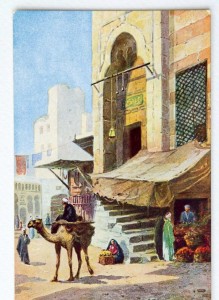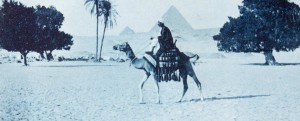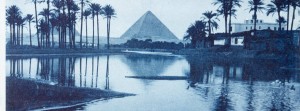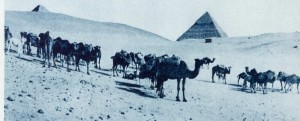(Continued from previous post located HERE)…
TO REDEEM THE PAST:
Glimpses of the Great War based on the letters of Eric Standring
©2014 All Rights Reserved
Time came for the regiment to depart. Eric had now been appointed the regimental trumpeter and as such he left the Tahuna camp before the main body of men. They had a busy day loading the horses. There was a great crowd on the wharf at Port Chalmers but he managed to see his brother Vic before setting sail on the “Hawkes Bay”.
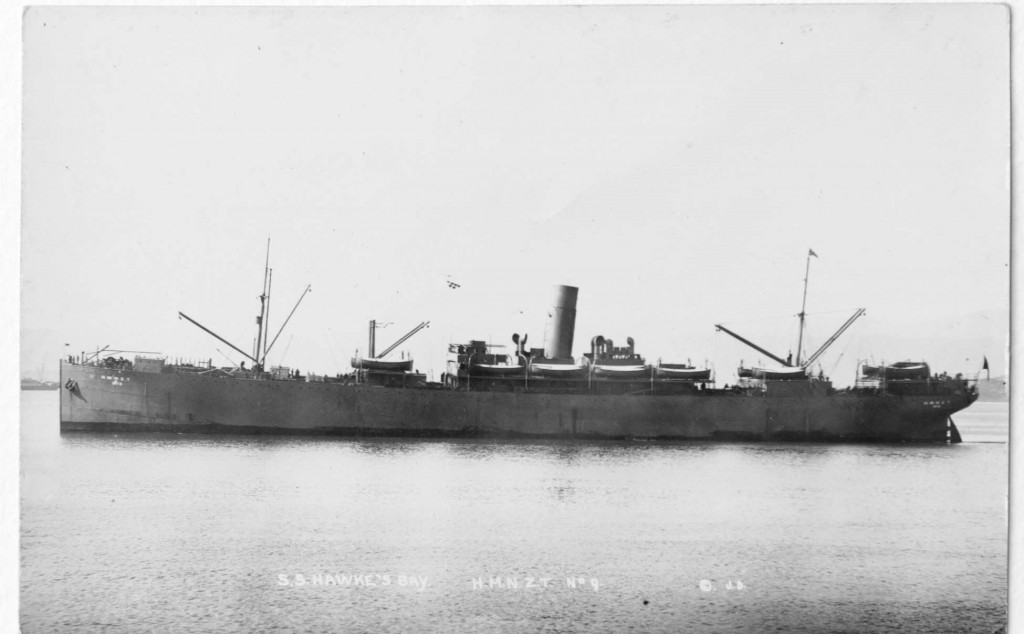
Eric wrote a touching letter to his sister Gladys.
Dear Gladys,
I am writing to you separately to say goodbye to you once more as you are my only sister and I am most proud of you.
Well goodbye till I see you next time and I will try to get a VC for you to wear for a brooch when you go for a spree on great occasions.
Be a good girl and don’t forget me
With greatest love
Your Brother and playmate
Eric
If I should get killed don’t go into mourning for my sake Gladys
The “Hawkes Bay” was met at Wellington on 23 September with ships from other ports and they then sailed into Wellington Harbour one after another. The ship tied up at the wharf in the pouring rain. Only a “farmerly-looking man and his three daughters were on the wharf” and MP’s Thompson and Scott.
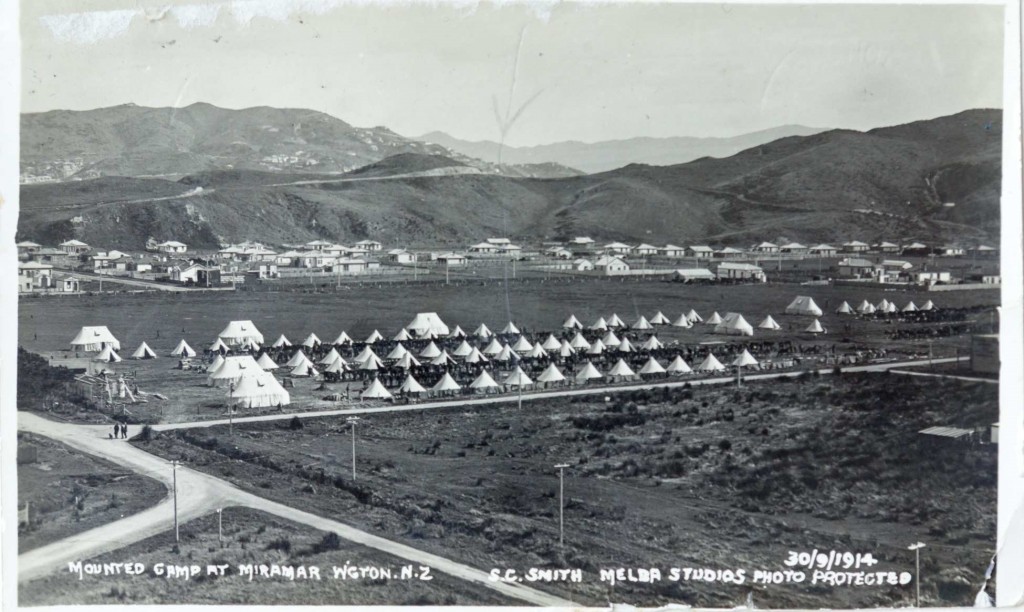
When they disembarked they walked the horses to their camp in Miramar. Eric, as the trumpeter had no fatigue work or horse picket guard at night. He had an infected cut in his neck. He was pleased that there is not nearly so much drinking in this camp “as it is only the mounted chaps and they are a decent crowd”.
The Prime Minister, William Massey was concerned about the safety of the convoy and held them back for three weeks until extra naval protection arrived in the form of the armoured cruiser HMS Minotaur and the Japanese battleship IJN Ibuki.
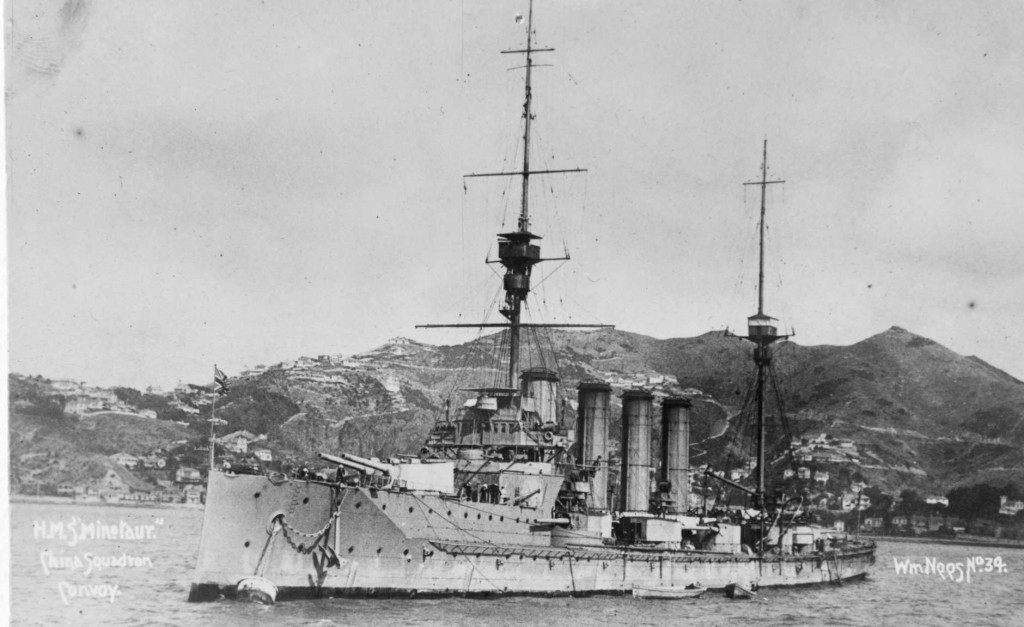
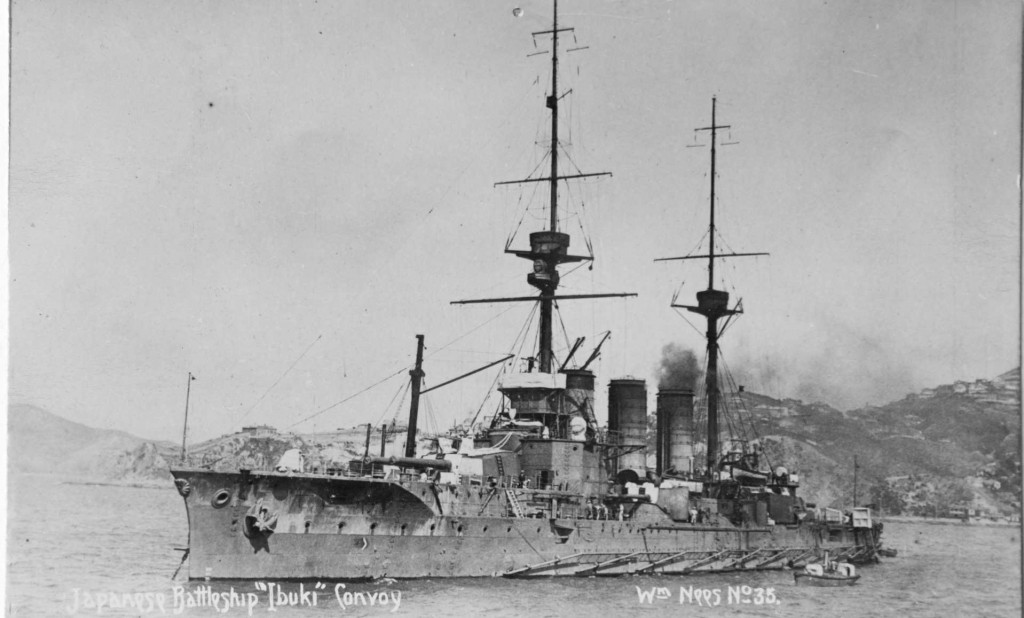
The OMR struck camp on Tuesday but had a night bivouacking and left for the boat on Wednesday. They went on board about noon and pulled into the stream at 5.00 pm on 16 October 1914. The ships sailed out of Wellington Harbour. Eric wrote to his father “so I suppose I will not set foot on New Zealand for some time”. He was not yet 20 years old and he would never see New Zealand again.
Eric soon “tossed the trumpeter job” at the promise of the next Corporal’s vacancy which did not appear to come for some time.
The “Hawkes Bay” sailed to Hobart where they had twelve hours off the ship and did a route march. Then on to Albany in Western Australia where they met up with 28 ships carrying the Australian Imperial Force. They stopped at Colombo in what is now Sri Lanka where they stayed for two days and were allowed off for a few hours. Eric sent some postcards to his family.
The convoy reached the Red Sea.
We anchored about 3 miles off opposite the town and near the African Coast. The place Aden is a very precipitous mountain, rising almost straight out from the sea in very steep buffs to about 3000 or 4000 feet high. On the highest peak there is a little white signal station. On the African side, there is nothing but red and yellow desert with sharp chains of mountains. Some of them most curiously shaped. A lot of tramps and merchant ships kept passing us here. The Red Sea is called red, I reckon, on account of the very red sunsets they have here. Everything is blood red at sunset.
The regiment was pleased that it lost less than 1% of the horses transported.
It was most intensely hot and you can imagine what it was like working between decks among 300 horses packed as tight as sardines; at least you can’t imagine. We got so used to the smell that we hardly noticed it. We just wore a pair of dungaree trousers and they were ringing with sweat in no time. We were nearly blinded by the sweat running in our eyes.
The convoy arrived at Suez on 30 November. The “Hawkes Bay” went on to Suez overnight and entered the Suez Canal about 3.00 pm. Streets along the canal were crowded with people cheering.
The Canal is only about two chains wide with a high banks on both sides in most places. At other places the Canal is higher than the surrounding country. It was full moon the night we went through and I happened to be on horse picket duty from 10.00 pm until 2.00 am so I had a good view. The Canal just now is lined all the way by Indian troops, about 45,000 of them on account of the Turks. Kennedy had to make an attack on the canal in one place for two days before we went through, but it came to nothing. We passed several camel caravans going along the desert and saw a few Arabs in their picturesque rags watching the ships go past. We all had two search lights fitted up in the bows although it was nearly as bright as day.
After halfway house a railway runs along the bank and also a fresh water canal. It was a wonderful trip. Once after 2:00 am I was awakened by my mate to see a big P and O boat which was tied up while we passed. I could have jumped on board from where I was sleeping on the main deck. Most of the passengers were asleep but a few flung books and papers on board as we passed. We anchored at Port Said about 4:00 in the morning. We were near the end of the Canal so all the Australian boats passed us. Some of them were real snorters for size.
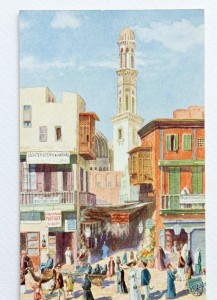
Life in Egypt
The ship stopped at Alexandria:
We unloaded the horses the first day and took them through the streets to some huge stables in the town. It was an exciting job leading them three at a time, as they were mad to gallop on and stretch their legs after the long stand in the boat. Also the strange sights and colours and camels and donkeys nearly scared them out of their wits.
The OMR camped at Zeitoun. It was about 3 minutes from the station and half hourly trains ran into Cairo. Eric was very impressed by the trains.
The first period class carriages are beautiful. They have all fitted out with pictures, beveled mirrors, and cushions. The gauge is half is wide again as New Zealand Railways. It takes about half an hour to get to Cairo main station as there are about seven or eight stops between.
It is rather rotten camped in the desert. We have just had a two day sand storm. All you can do is to close out what your tent and to lie and suffocate. It is deadly out in the storm. The air is full of sand and the wind is awfully hot.
Eric was fascinated by Egypt; the heat, the sand, the fruit, the history and the diversity of people. He enthusiastically wrote about it to his father and sent a number of postcards of the sights.
The rest of Cairo is nearly all native quarter. You can go through streets so narrow they are like tunnels. They are full of natives of all races, Arabs, Bedouins, Negros, Greeks, Italians, Romanians and every kind.
All along the streets are shops. Most of the goods are outside and all around the shop and only the owners are inside. Every now and then there is an opening off the street. These lead into bazaars. They are good shows. If you want to buy anything you have to haggle for it as they ask at least three or four times what they expect to get. In a bazaar you can get nearly anything you want. If the men you are on to, hasn’t it, he says his brother on or father has it and leads you to it if you will go. The natives are pretty scared of soldiers, but it is not wise to go anywhere near the quarters by yourself.
The day after Egypt was proclaimed British, all the NZ troops had a march through the quarters, the very worst, to overawe the natives. We Mounteds had a great squeeze to get through some of the streets four abreast. I believe trouble was anticipated as we all had rifles loaded and ammunition, but all was safely accomplished.
There are a very few English and Cairo. All the Egyptians are French, French hotels, ships, and restaurants. I have not seen a dinkum English shop it all. You can go into a shop and a man as dark as a Maori says, “me English sure I come from ze England”. You just say “liar”, and he confesses he is Greek, or something but says the English are good. Every one of the hawkers who come around you in their hundreds calls the things “goooooood”. They say oranges are very “goooooood”.
He comments in his letters several times about the little children in poverty with flies around their eyes.
Meeting the Jessops
The Americans supported the YMCA in Cairo and it was headed by the Secretary William Jessop. The Jessops worked with British troops trying to provide activities that kept them away from the temptations of Cairo.
Shortly after his arrival in Egypt, Eric was approached by the Jessops:
He (Mr Jessop) invited me to his house and Cairo but I could not go at once, as we were the regiment on duty. I got leave for 48 hours on New Year’s Eve to go and spend New Year with them. I landed down at their flat as soon as I got off duty on New Year’s Eve at about 10:00 pm. They were having an evening and I go out in just in time for supper. They were nearly all Americans, from the American mission and the Vacuum oil company, as Mrs Jessop is an American, and, I fancy, used to be in the American mission. Anyway I had a jolly decent time and went to the church at mid night with Mr and Mrs Jessop. And I stayed there all night. It was lovely to sleep in a bed and have a decent bath. They have a flat in a big building. They have no children. It was a funny coincidence while I was there are that Mr. Jessop got a letter from British Columbia telling him that Mr Standring had written to tell that his son Eric was away to the war.
He would continue to catch up with the Jessops and as Mrs Jessop kept corresponding with him throughout the war.
Story continues on Next Post…
(If you have missed reading parts of this series, please Start Here)
(If you are ready to move to the next article, Click Here)

